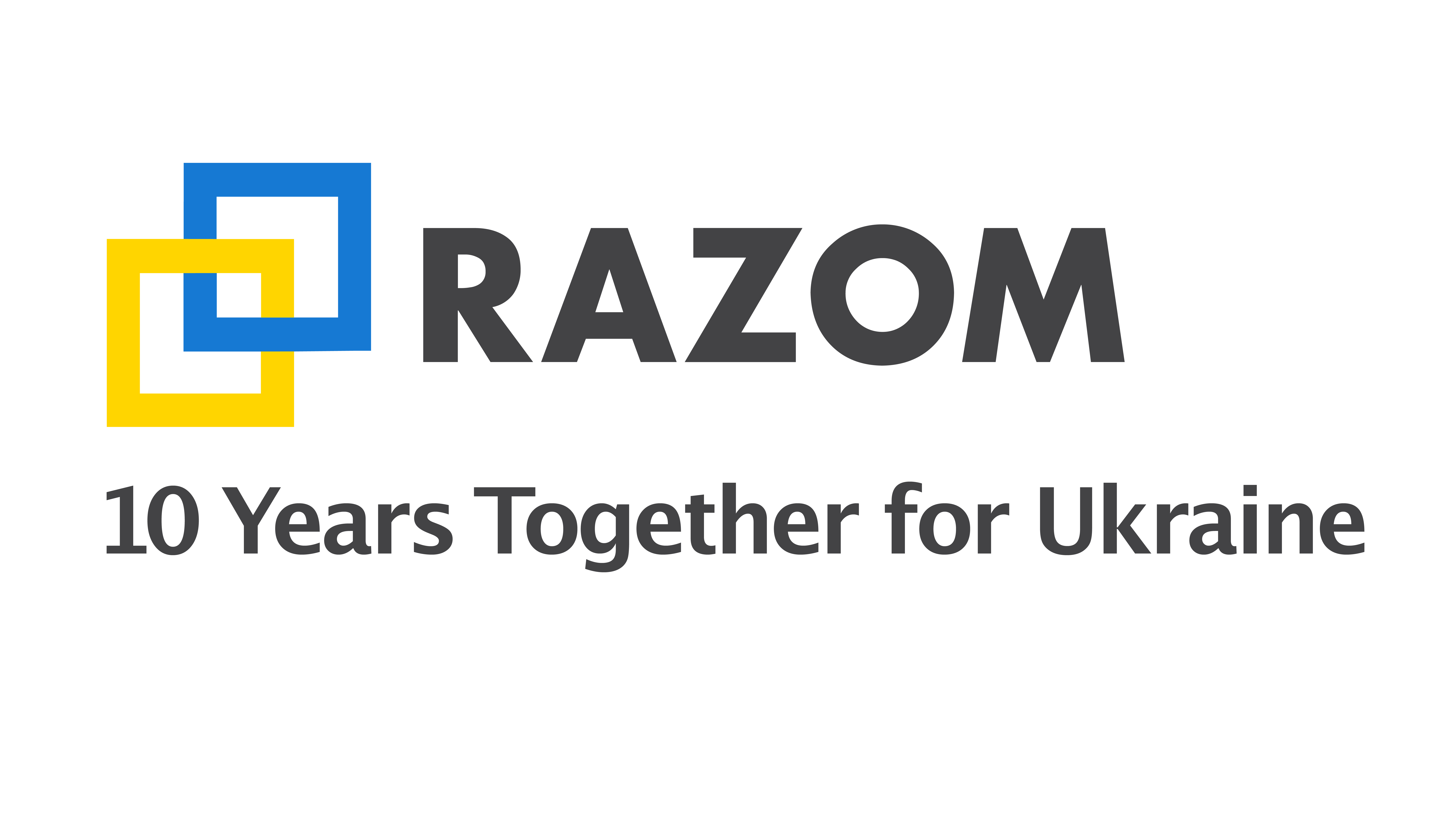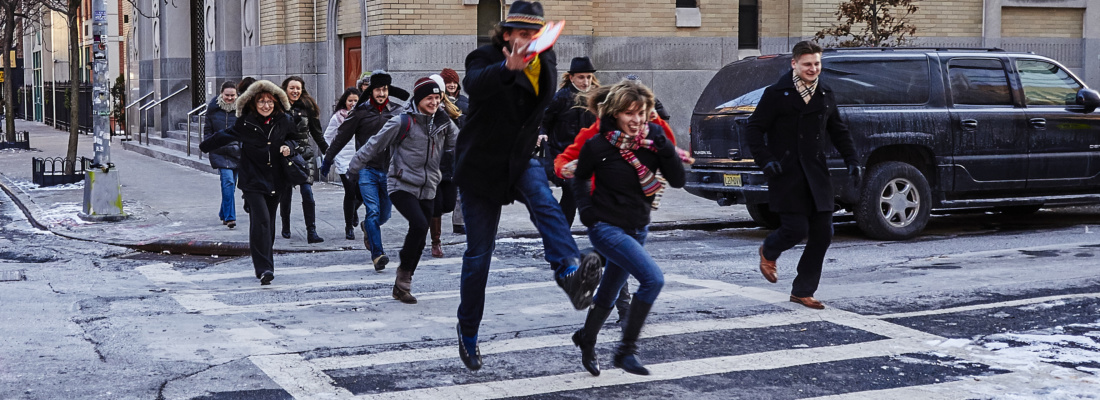For Razom volunteers, 2016 was a year of investment and institution building. Volunteers hunkered down and did lots of behind-the-scenes work. We hope you noticed some of it, like finding out about projects from the new website. We also made it easier for volunteers to meet in person by hosting get-togethers in New York, Washington, Austin, Chicago, and Kyiv. We’re excited to work shoulder-to-shoulder in the US and in Ukraine on specific projects, crossing time zones and oceans.
Thank you for all your support, time and contributions. We look forward to continuing to work together in the coming year to increase civic engagement and to amplify voices of people from Ukraine.
RAZOM AID
Toy Drive continued sending personal packages to families in Ukraine. They sent gifts to an orphanage in Karapchivskiy and helped out St. Nicholas in delivering gifts to children in Ukraine for the holidays.
Over the summer, the Toy Drive team took on the special #schooldrive project. Volunteers bought and filled 232 backpacks with school supplies and sent them to 8 volunteer centers in Ukraine where they were delivered to children of ATO victims.


We launched The Neurosurgical Consultant Program in Ukraine (NCPU), which aims to address the significant deficit in high-quality neurosurgical training in Ukraine.
As the founder and co-director of NCPU, Luke Tomycz MD recently traveled to Ukraine where he worked with neurosurgeons in Kyiv for about a week to examine over 100 patients and perform five life-saving brain and spine surgeries. Our team plans to spend 3-4 months in Ukraine starting in the spring of 2017 with the primary objective of providing training in the surgical treatment of spinal disease.
RAZOM CULTURE
In 2016 Razom Culture acted as a platform for artists in various fields to collaborate on Ukraine themed projects.
We hosted events that gave the audience a chance to experience contemporary Ukrainian music, art, film, and fashion. All in one evening. For instance, Razom. Art. Jam party started with a video installation by Sashko Danylenko and included music performances by Roman Bardun Trio, Letters to Nepal, pianist Alex Pryrodny, and a fashion show by Ira Lysa.


What is becoming a tradition, we had a great time showcasing culture at Ukrainian festivals.
Our Razom Lounge at the St. George’s Ukrainian Festival attracted local New Yorkers with interactive activities, including Skype sessions with Ukraine, Q&A with filmmaker Damian Kolodiy, jazz by Roman Bardun, a dancing lesson on the street, and a live painting session with Sashko Danylenko. At Soyuzivka, we co-hosted a film festival showing the diversity of films being made in Ukraine.
In New York, we organized a walking tour of Ukrainian diaspora landmarks with visitors. Razom Culture team also worked on expanding our reach to far away lands of southern US.
In October, we hosted our first Razom Culture event in Austin, Texas – Charity Photoshoot with Getty photographer Waytao Shing. In addition to celebrating the beauty of Ukrainian dress and jewelry, the event also gathered funds for the Razom IT initiative.

RAZOM IT

Our yearly Razom IT Summit brought notable names in Ukrainian technology together with about 100 representatives from U.S. and Ukraine-based accelerators and incubators. It allowed for a valuable exchange of experience and ideas between Ukrainian and U.S. technology communities.
Keynote speaker Oleksandr Starodubtsev shared his experience on delivering reform through tech with ProZorro, an online public procurement service in Ukraine in his keynote address, “Real Change in Ukraine is Happening: Civic Technology Against Corruption”.
We held 6 speaker series events, showcasing interesting projects and building the entrepreneurial tech community in New York with roots in Ukraine.
Guests included interior designer Slava Balbek, a Swedish company investing in the future of Ukraine, promising Ukrainian startups participating in a NY accelerator programs, and activists who are using tech to develop local engagement and community in Lviv and Odesa. In Dnipro, Andrey Akselrod presented on U.S. and Ukraine startup cultures.


In May, Razom brought entrepreneurs from Ukraine to New York City to connect with the tech start-up community.
The week-long immersive program was designed to help teams from Ukraine accelerate the development of their ventures. Every day of their trip, the startups had face time with investors, mentors, or advisors. They met with accelerators, got a chance to gather advice from a workshop at Dentons, and practiced their pitches at multiple events. The trip culminated with presentations at a long-running pitch night called ‘Are You Serious?’.
RAZOM THINK
When a group of graduate students attending meetings on Capitol Hill were told that there is a need for more policy-oriented information on Ukraine, they sprung into action.
Led by Razom volunteer Mykola Murskyj, a team of writers came together to create the report titled U.S. Policy on Ukraine: Challenges and Opportunities. The report, with an objective to engage and inform policymakers, is in its final stages of production and will be released in early 2017.


In October we visited the golden hills of Vermont to talk about non-profits with 70 Masters students at SIT Graduate School.
For 4 hours, we discussed Razom’s history, goals and the motivations of individual volunteers. We described the Maidan revolution and how it spurred us into action and answered many questions about Ukraine, propaganda, and the conflict in Eastern Ukraine. Students also offered their thoughts and advice on best practices for effective impact and sustained growth. Everyone walked away with new knowledge and ideas.
We held several discussions and roundtables.
In the spring, we co-hosted a discussion on the collapse of independent media in Ukraine together with Freedom House and Volya Institute for Contemporary Law and Society at Civic Hall.
In the fall, we co-hosted a lively discussion on history with Istorychna Pravda founder Vahtang Kipiani at Columbia University.


Project OKO continued monitoring media mentions of Ukraine in 13 languages. Our database contains almost 1,000,000 articles. During a year we published 10 monthly reports on coverage of Ukraine in the world on Platfor.ma. Global Ukraine News, VoxUkraine, and site.ua used OKO data to publish their own analytical reviews.
The project won EGAP E-Democracy Challenge. Lead Iryna Kupchynska gave several lectures for students about media monitoring and was invited by UN Women to Donetsk and Luhansk regions to share her expertise on foreign media coverage of Ukrainian conflict.
RAZOM PARTNERS
We continued our successful partnership with Hromadske Radio. In 2016, we sent $4,500 in grants for the development of original radio programming.
Hromadske Radio spent a week in New York City and Washington, D.C. to connect with their US counterparts in public radio. U.S. Embassy in Kyiv awarded the travel grant, while Razom volunteers arranged the program and hosted the team. The program included meetings with radio stations in New York and Washington, D.C., as well as roundtable discussions with the Ukrainian community.


We helped bring 16 artists to Galicia Cult 2016 in Kharkiv, a multidisciplinary social-cultural forum that aims to introduce eastern Ukrainians to modern western-Ukrainian culture.
When the organizers came just a little short of their goal through local fundraising, we partnered to quickly raise the money abroad in order to get the artists to the festival.
With a successful MathOlymp fundraising campaign, we supported observers facilitating Ukrainian team’s participation at the 2016 International Mathematical Olympiad in Hong Kong.
Our young mathletes came back with 4 silver and 2 bronze medals! Ukraine’s team came to be 30th in the world by the cumulative result of its team members. We are very happy to hear that they had a great experience.


By our recommendation, three Razom members and specialists in educational reform participated in the Open World Leadership program.
Sergiy Kornyliuk from Kyiv (EIDOS), Oleksiy Prokopenko from Odesa (Department of Education, Odesa) and Liliya Borovets from Lviv (GoFundEd) spent 10 days in the Washington, D.C. and Iowa, gaining a valuable experience and knowledge for their continuing work in Ukraine.
REFORMERS WITHOUT BORDERS
The idea of Reformers Without Borders was conceived on January 1. By May, our fellow Hugo Spaulding, a Washington D.C analyst, was starting his work in Odesa.
Hugo led logistical preparations for an international conference between EU and Ukraine, conducted 10 field visits around the region to identify development challenges and potential projects, provided translation services to the Agency of Investment and Development, held a workplace English-language training series for the staff of the Odesa Customs office, and more.


Hugo was joined for several weeks by George Barros. They organized a seminar about the U.S. legislative system for activists in Odesa. Lyuba Shipovich continued her work on the ground in Odesa. She helped create procedures and processes to facilitate Foreign Direct Investment in the Odesa region, while RWB consultant Kateryna Mikhno managed due diligence. Learn about their accomplishment in our program year-end recap.
We received great feedback from locals in Odesa, where the work of our fellows positively influenced both local government officials and civil society activists.
FINANCIALS
$74,649 in revenue.
$85,545 in expenses.
Supported by 134 donors.
See these numbers rise by donating today.
Thank you to our incredible volunteers and supporters who donated their time, smarts, and money to make all of this possible.
[wpedon id=”1405″ align=”center”]
